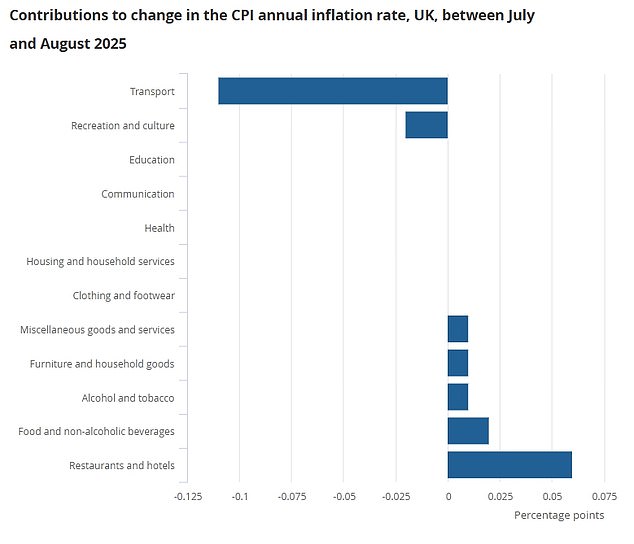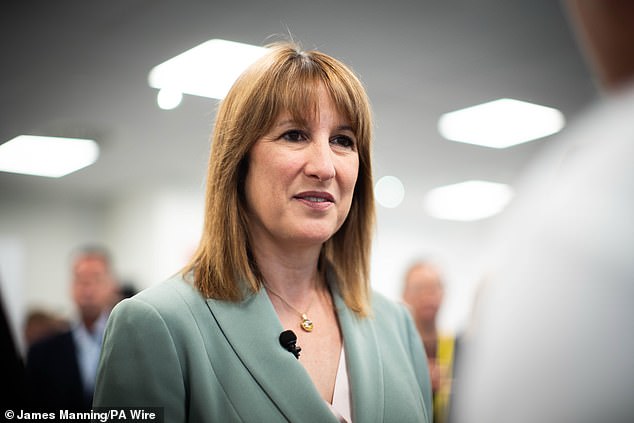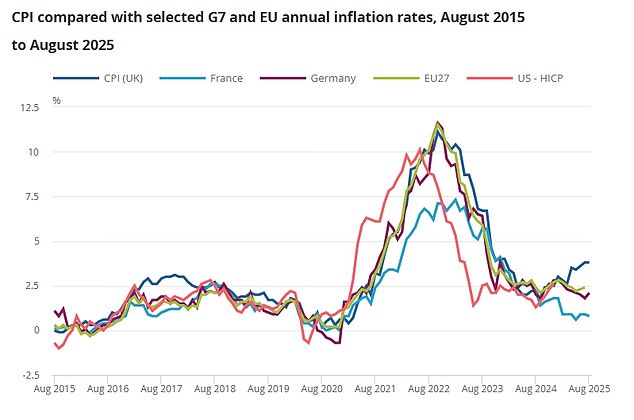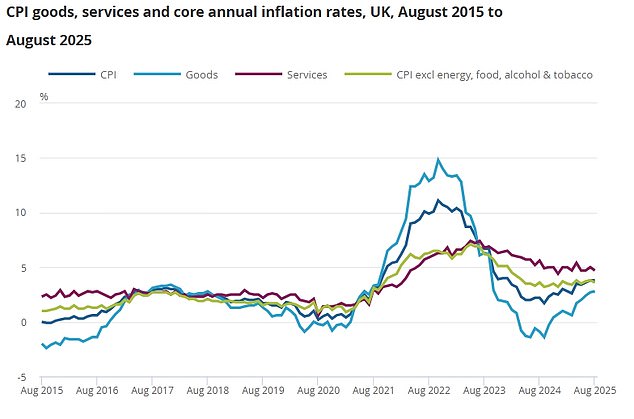Inflation is still stuck at nearly double the Bank of England‘s target as Rachel Reeves faces more bad news ahead of the Budget.
Official figures showed surging food costs helped keep the headline CPI at 3.8 per cent annually in August.
Experts said the number – in line with analysts’ expectations – puts ‘the final nail in the coffin’ for hopes of an interest rate cut tomorrow.
Alarmingly, food inflation nudged above 5 per cent for the first time in 18 months, going from 4.9 per cent to 5.1 per cent.
That was offset by falls in areas such as transport costs, while in a small silver lining closely-watched core inflation – excluding energy, food, alcohol and tobacco – eased slightly.
The grim picture emerged amid warnings that Ms Reeves’ Budget problems will be worsened by downgrades to productivity.
There are concerns the Office for Budget Responsibility will slash UK productivity forecasts – output per worker – and leave the Chancellor scrambling to find an additional £9billion, or even more.

Food inflation nudged above 5 per cent for the first time in 18 months, offset by falls in areas such as transport costs

Inflation is still stuck at nearly double the Bank of England’s target as Rachel Reeves faces more bad news ahead of the Budget
ONS Chief Economist Grant Fitzner said: ‘After last month’s increase, annual inflation was unchanged in August as various price movements offset each other.
‘The cost of airfares was the main downward driver this month with prices rising less than a year ago following the large increase in July linked to the timing of the summer holidays. This was offset by a rise in prices at the pump and the cost of hotel accommodation falling less than this time last year.
‘Food price inflation climbed for the fifth consecutive month, with small increases seen across a range of vegetables, cheese and fish items.’
Retails have been desperately urging the Chancellor not to hit them with more swingeing tax increases at the Budget.
But Treasury Chief Secretary James Murray denied Government policies such as the national insurance hike and bolstered workers’ rights were behind increased supermarket prices.
He said: ‘We know that a key factor in terms of food prices is global commodity prices and that’s why it’s so important that we’ve struck the three trade deals which we have, because those trade deals not only help with jobs and investment in the UK but they also help to bring down the cost of things at the supermarket checkout.’
But shadow chancellor Mel Stride said the situation was ‘deeply worrying for families’.
‘Labour’s decision to tax jobs and ramp up borrowing is pushing up costs and stoking inflation – making everyday essentials more expensive,’ he said.
‘With borrowing costs hitting a 27-year high, working people and businesses are bracing for even more tax rises to pay for Labour’s mismanagement.’
Suren Thiru, Economics Director at ICAEW, said the inflation figures for August offered ‘no respite’ for households and businesses.
‘August’s unchanged outturn could be followed by an unnerving upswing this month with skyrocketing business costs and food prices likely to see inflation breach the 4 per cent mark in September, despite a weakening economy,’ he said.
‘Slowing services and core inflation offers a rare silver lining as it suggests that underlying price pressures are becoming less sticky. The squeeze from a cooling jobs market should help keep it on a downward path.

UK inflation has been running higher than in other G7 countries

Increases in goods prices have been driving the CPI number recently
‘These figures are the final nail in the coffin for hopes of a rate cut tomorrow, and with the vote split among rate setters likely to confirm a hawkish hold, another policy loosening this year looks remote.’
Allan Monks, UK economist at JPMorgan, told the Financial Times that even shaving 0.1 or 0.2 per cent from productivity would leave a hole of between £9billion and £18billion.
‘We don’t know precisely what they [the Office for Budget Responsibility] are going to say on productivity, but we have been given indications there will be a downgrade,’ one official told the paper.
The latest Office for National Statistics (ONS) figures showed productivity fell in the second quarter of this year compared to a year ago.












